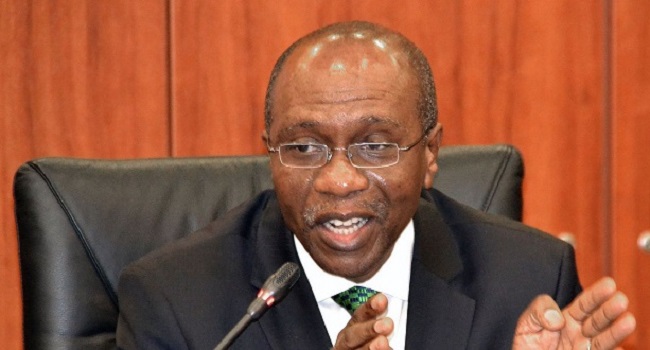Business
CBN mulls cut in interest rate as economic crisis worsens

The Central Bank of Nigeria (CBN) is contemplating a downward review of the lending rate as a buffer against the current economic austerity and as a stimulant for growth.
Godwin Emefiele, the CBN boss, made the disclosure at the Going for Growth session in Abuka during the weekend, saying that central banks in the major economies of the world are responding to the global economic crisis by making reforms that foster growth and cushion the effects of the coronavirus outbreak.
Mr Emefiele noted that the conference was timely considering that the economy is currently battling the external vulnerabilities posed by lower oil receipt triggered by the oil price war between Saudi Arabia and Russia and the sweeping hazards of the pandemic on global trade as a whole.
“The impact of the coronavirus across over 100 countries, has affected global supply chains, as well as demand for goods and services. Commodity prices have also been affected, as crude oil prices have plummeted by over 45 per cent since January 2020.
“The CBN fortunately had already embarked on similar measures which have resulted in significant reduction in lending rates, as part of our efforts to boost growth. Working with the fiscal authorities, we will not hesitate to deploy additional measures to strengthen our buffers and insulate the economy from the global headwinds,” the CBN chief said.
He reiterated that the International Monetary Fund (IMF) had at the beginning of this year estimated global economic growth for 2020 to be 3.3 per cent compared to 2.9 per cent in 2019.
Read also: Oil prices drop to $32.55 as Buhari calls for economic diversification
He went further to say that “with the onset of the virus, global growth is expected to decline in 2020, but the extent of the decline would depend on how the epidemic is contained over the next few months.”
The CBN chief observed that the resolution of the apex bank to raise banks’ Loan to Deposit Ratio (LDR) from 60 per cent to 65 last year was instrumental in sustaining growth in 2019.
“We also imposed restriction on access to Open Market Operation (OMO) auctions to encourage banks to lend to the real sector. Indeed, the banking sector has responded positively with the rise in aggregate industry credit from N15.3 trillion May 2019 to over N17.4 trillion in January 2020.
“I am aware that these loans have been granted to borrowers across different sectors at considerably lower rates. Although a lot more still needs to be done, we intend to sustain these policy measures, as it will help support improved economic growth and create more employment opportunities,” he affirmed.
Join the conversation
Support Ripples Nigeria, hold up solutions journalism
Balanced, fearless journalism driven by data comes at huge financial costs.
As a media platform, we hold leadership accountable and will not trade the right to press freedom and free speech for a piece of cake.
If you like what we do, and are ready to uphold solutions journalism, kindly donate to the Ripples Nigeria cause.
Your support would help to ensure that citizens and institutions continue to have free access to credible and reliable information for societal development.




















